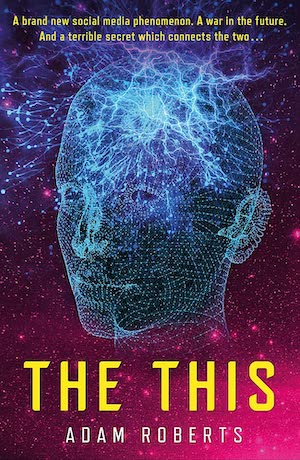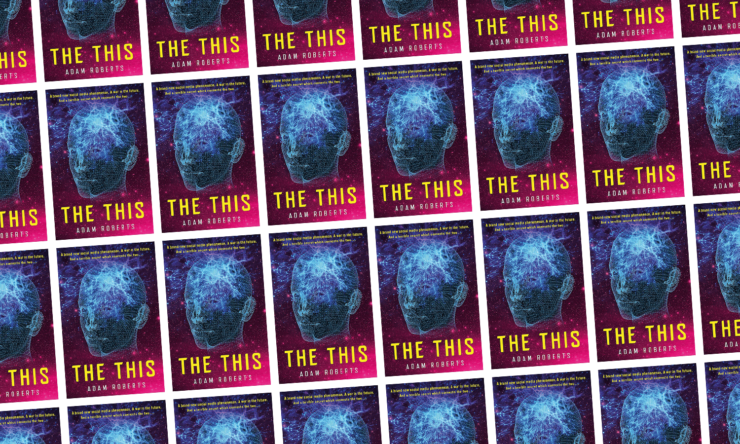In the years before social media turned into an outright nightmare most of the time and the algorithm powering YouTube veered past the uncanny valley and into something monstrous, there was a moment when random things would come up online that had the power to delight. Among them: people coming up with attack ad-style videos about 19th century philosophers. I have no idea what the context behind these was, but the Kierkegaard and Kant ones were and are hilarious. (There was also an attack ad directed at Nietzsche which seems to be lost to history.) You wouldn’t necessarily think that this combination would work, but it does.
Such is the case, too, with Adam Roberts’ memorably-titled The This. In his notes following the novel, Roberts writes that the writings of Hegel were a primary source of inspiration for him, and that this novel “follows, and is in some respects in dialogue with, an earlier Kant-novel of mine called The Thing Itself.” But while that novel was set in the recent past, The This is largely set in the near future—except, of course, for the scenes set in the bardo.
Liminal states of existence are not all that widespread in science fiction; the primary example I can think of in terms of a novel that also included a lengthy scene (or scenes) in the bardo is Kim Stanley Robinson’s The Years of Rice and Salt. This novel takes a slightly different stage; if the bardo provided a structural function for Robinson’s novel, it acts in a more thematic fashion for Roberts’. The This begins in the bardo, with one character endlessly reborn over a series of countless lives, moving forward and backward in time. It’s an odd opening for a novel that presents itself as a satirical take on technological utopianism and cults, but hey, sometimes the unexpected can be deeply rewarding.
Buy the Book


The This
That’s the case—for the most part, anyway–when it comes to Roberts’ novel. That opening chapter feels almost like an overture for the book that follows; less a plot-heavy means by which certain threads can be set in motion and more of an introduction to the themes Roberts is addressing here: the relationship of the individual to the connective, the question of what separates one person from another, the notion of cyclical states of existence. You know, minor things like that. Think of the bit with the man who may or may not be a dybbuk in the film A Serious Man, or the opening nine minutes of Magnolia, and you get the overall gist.
From the cosmic, Roberts then takes the reader to the decidedly mundane world of Rich, a freelance writer working in a near-future society where the gig economy has become even more dominant than it was before. As a result of one assignment, he becomes aware of The This, which is something in between a social network and a hive consciousness. Rich eventually becomes involved with a group working to combat The This, including a dying woman named Helen Susana.
At one point, Helen addresses her health issues, for which Rich apologizes. “Not your fault!” she tells him. “Cancer’s fault, and you are not cancer. You and cancer are different things. Unless subject and object being distinct is just an illusion, eh?” Right about here is likely when readers well-versed in their Hegel may note some familiar concepts. For the rest of us, Roberts eventually spells out where this is going.
The chapters featuring Rich alternate with another plotline, set many years later, about a frustrated man named Adan who becomes involved in a military campaign against a collective consciousness. It’s relatively clear from the outset that this is what The This eventually becomes, but some dissonances remain—including the matter of why Adan has occasional visions that prove especially useful as his work in the war continues.
Eventually, Roberts makes it clear how both the Rich and Adan plotlines are connected, as well as what it has to do with the bardo sequence that opens the book. The This never lacks for ambition, but it can also be–how best to phrase this?—a lot. The chapter in which Rich is introduced, for instance, juxtaposes his story alongside columns of social media discourse—which feels overwhelming at times. Eventually, Roberts does reveal the underlying structure, but there’s a lot of ambiguity built in about where this is all going.
In the end, though, the thematically ambitious story Roberts is telling ends up clicking on more levels than it doesn’t. And if the narrative’s turn for the metaphysical seems jarring, that opening scene in the bardo certainly foreshadows that shift. There’s a lot happening here, but the high concept approach Roberts employs here makes for a thought-provoking read.
The This is published by Gollancz.
 Tobias Carroll is the managing editor of Vol.1 Brooklyn. He is the author of the short story collection Transitory (Civil Coping Mechanisms) and the novel Reel (Rare Bird Books).
Tobias Carroll is the managing editor of Vol.1 Brooklyn. He is the author of the short story collection Transitory (Civil Coping Mechanisms) and the novel Reel (Rare Bird Books).










